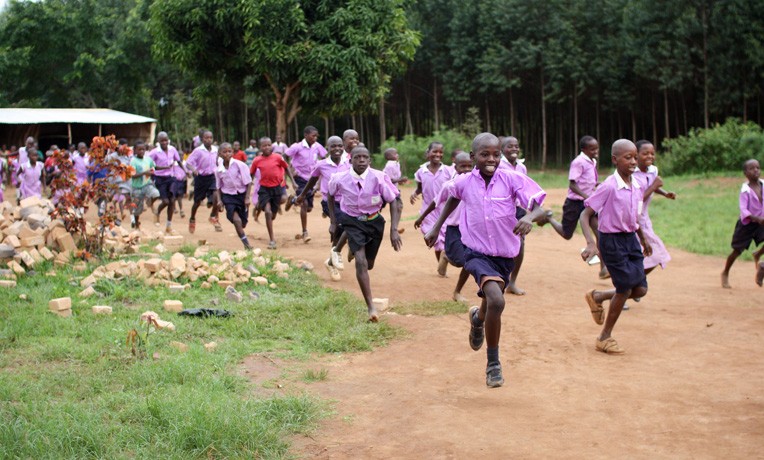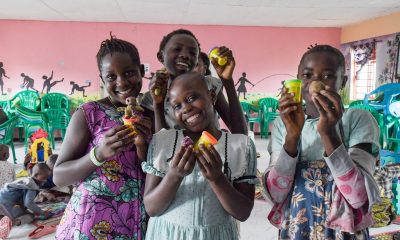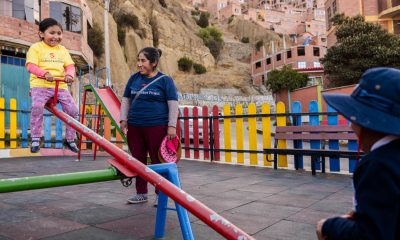A Samaritan's Purse project in Uganda helps vulnerable children stay with their families
Uganda passed the Alternative Care for Children Initiative (ACCI) in 2011 to deal with the ever-increasing number of orphanages full of children who weren’t legitimate orphans and weren’t being properly cared for. At the time, the Ugandan government estimated that more than 60 percent of children in orphanages weren’t actually orphans. Though the problem was and is complex, one of the major contributing factors to this statistic is poverty.
“When we ask [families] why they don’t stay with their children, we find that it is mostly for financial reasons,” said Fatumah Namata, an officer for the Samaritan’s Purse Uganda Orphan and Community Empowerment Project (OCEP).
With money coming in from sponsors and international adoptions, having “orphans” can become a way of making money for some parents and orphanage directors. At the very least, one less child to feed lightens the financial burden of parents.
After the ACCI initiative passed, the Samaritan’s Purse Reintegration Project began working to transition children back into their homes.
The Reintegration Project is focused on keeping children in families and out of orphanages.
“We have a saying here in Africa: However good the other person is, they cannot look after your child better than you,” Fatumah said.
When doing child protection, which is what the Reintegration Project does, it needs to be in the best interest of the child. The best interest of the child is, almost always, to be with parents. God intended children to be raised in a loving family.
Reintegration Project staff work with orphanage directors like Grace and Rachael of My People Childcare Ministries to help them equip parents to care for their own children. Our staff also help trace the parents of the children.
Grace, a pastor who was formerly a teacher, and his wife Rachael, a tall Karamojong woman from the most remote region of Uganda, started My People Childcare Ministries nine years ago as an orphanage. They had good hearts and good intentions, but they struggled to provide for the children they wanted to help.
“The reason we decided to start a home [for orphans] is because I personally grew up on the streets of Kampala,” Rachael said. An orphan herself, Rachael’s heart broke for the hundreds of children growing up on the streets of Uganda’s national capital with no place to call home. As a young girl, Rachael’s life involved wandering potholed roads, sleeping next to garbage, hunger, begging, and the constant risk of being raped in the night.
Rachael’s life changed when a woman found her sleeping on the streets, brought her into an orphanage, and taught her about Jesus.
Rachael met her husband, Grace, while doing inner city outreach with their church. After marrying, they began bringing children into their home.
“It was so painful,” Rachael recalled. “Mothers would say to us, ‘Please take our children. Please give them a chance.’” Rachel and Grace wanted to help.

Grace wrote a prayer for the school that the children have all memorized: “Oh Lord, make me a channel of peace. Help me to bring peace where there is no peace. Where there is hate, I will bring love. Where there is fighting, I will bring Christ. Where there is bitterness, I will bring joy. I pledge to be a channel of peace with your help. Amen.”
In Uganda, 96% of children are considered vulnerable. This is due to the fact that many children don’t have the opportunity to attend school, don’t have access to doctors and medication, or are simply not able to have their basic needs met. Parents who can’t afford to raise their children will often willingly send them off to be raised by relatives or orphanages with the hopes that the child will have a chance at a good life.
Becoming an “orphan,” though, comes with its own set of social stigmas. They are pitied by some and viewed as a problem and liability by others. Orphans in Uganda grow up knowing everyday what it means to be vulnerable, dependent, and a burden.
“These children go through pain,” Fatumah said. “They have emotional pain. They lack in some way. They might have food, sleep well, and dress nicely, but they don’t have a sense of belonging…Some might not even know who their parents are.”
My People Childcare Ministry wanted to be a blessing to these children, but they struggled caring for so many at once. After a few months, Grace and Rachael had 68 children staying in their two-room house. The children kept coming, and soon they couldn’t afford their home anymore and didn’t know what to do. Someone recommended they contact Samaritan’s Purse.

John Paul is one of the ministry partners who works with the SP Reintegration Project. He loves children and loves teaching them about Jesus.
In order for reintegration to take place, our staff must go to parents and help them understand the importance of being parents to their children. Their thinking has to be transformed. Samaritan’s Purse helps prepare families to take on the responsibility of caring for their children again by empowering them with income-generating projects. The children are also taught practical and technical skills so they can be a blessing to their families.
After weeks of preparation, the moment a child is reintegrated with their parents is one full of emotion.

My People Childcare Ministry now operates as a Christ-centered boarding school open to all of the community.
“I love seeing the joy of these children when they reach home—seeing these families that can care for their children again,” Fatumah said. “You know the way you can just stand and say, ‘YES!’ I don’t know how to describe that feeling, but you feel you are changing lives.’”
Samaritan’s Purse has helped My People Childcare Ministry reintegrate all but 17 children back with their families, and community members have adopted 20 children that did not have living parents. By the end of the year, all 300-plus children that Grace and Rachael once took care of will have been reintegrated with families. The My People Childcare Ministry will continue operating as a Christ-centered boarding school open to all of the community.
“When I think of the story of the My People Childcare Ministry, I think of the verse Romans 12:2,” Fatumah said. “Do not conform to the pattern of this world, but be transformed by the renewing of your mind.”








